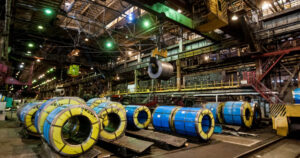
The Zaporizhstal steelworks in Zaporizhia is calling for restrictions on exports of scrap metal, a strategic raw material for the steel industry, and a moratorium on rail tariff increases.
According to a press release issued by the company on Monday, this was announced by Taras Shevchenko, acting CEO of Zaporizhstal, part of the Metinvest Group, during a working visit to Zaporizhia by First Deputy Prime Minister and Minister of Economy Yulia Svyrydenko.
Svyrydenko visited metallurgical, machine-building, and food industry enterprises. During the meeting with business representatives, current issues and expectations from state policy in the economic sphere were discussed.
According to the minister, more than 8% of Ukraine’s industrial production is concentrated in the Zaporizhzhia region, and despite the temporary occupation of 80% of the region and constant hostile attacks on the city, it produces almost 20% of the country’s metallurgical industry and about 7% of its machine-building industry.
Zaporizhstal, Motor Sich, Ivchenko-Progress, an automobile plant, and small and medium-sized businesses continue to operate in the city. Their representatives joined an open dialogue with the government’s economic team. Businesses voiced challenges and offered their own solutions to support manufacturers.
Shevchenko emphasized the urgent need to preserve duty-free trade with the EU for metallurgists and to postpone the introduction of the cross-border carbon adjustment mechanism (CBAM) in Ukraine, since national producers, unlike their European counterparts, do not have access to investments and modernization funds.
“The introduction of the CBAM in 2026 (…) will make economic recovery and the implementation of plans to modernize and decarbonize production in Ukraine impossible. Assessing the impact of the CBAM on the Ukrainian economy, experts expect GDP to fall by 4.8%, or $8.7 billion, in 2026 alone. For the same reason, the economy could lose up to $2.8 billion in tax revenues and more than 73,000 jobs in the manufacturing industry,” said the acting CEO of Zaporizhstal, citing the results of a study by CMD Ukraine.
A particularly painful issue is the mass export of Ukrainian scrap metal abroad, which causes an acute shortage of raw materials important for steel production. Shevchenko firmly believes that scrap metal can and will work better for the Ukrainian economy if it remains in the country. One ton of scrap metal for export provides minimal tax deductions and up to $350 in foreign exchange earnings, while one ton of steel from scrap metal brings in 15,000 hryvnia in taxes and $1,200 in foreign exchange earnings.
According to him, scrap metal is an indispensable raw material for the production of raw steel and metal products. The shortage of scrap forces metallurgists to pour cast iron into ingots and sell this low-margin semi-finished product. In four months, Zaporizhstal alone will offer the market pig iron with low added value instead of 300,000 tons of highly processed metal products.
“For the Ukrainian economy, the total negative effect will be approximately $75 million in lost foreign exchange earnings,” the top manager emphasized.
In addition, the CEO of the metallurgical plant also emphasized the need to establish a moratorium on increasing railway transportation tariffs. Since the start of the full-scale invasion, the share of logistics in the cost of metal products has quadrupled, as mining and metallurgical companies have switched to rail transport, and the cost of the service itself has increased by up to 60%. Railway logistics is critical for metallurgists: to produce 1 ton of metal, 3 tons of raw materials must be transported. Therefore, exporting 1 ton of metal requires transporting 4 tons by rail.
“Even a slight increase in rail tariffs leads to a significant increase in the cost of production, which becomes uncompetitive in export markets. In this case, exports lose their economic meaning,” emphasized the head of Zaporizhstal.
In turn, Svyrydenko assured the meeting participants of the importance of dialogue and attention to each of the requests voiced by the business community, for which the government’s economic team is seeking solutions. In particular, these include resolving the scrap metal shortage, introducing new financial instruments to support enterprises recovering from the war, improving the 15% compensation program, and so on.
The head of the Ministry of Economy thanked Zaporizhzhia businesses for their resilience, investments, and development despite all the challenges caused by the war.